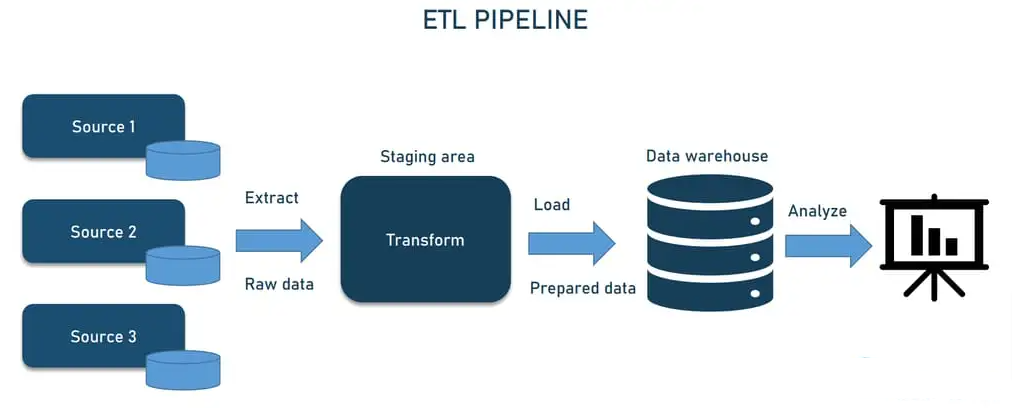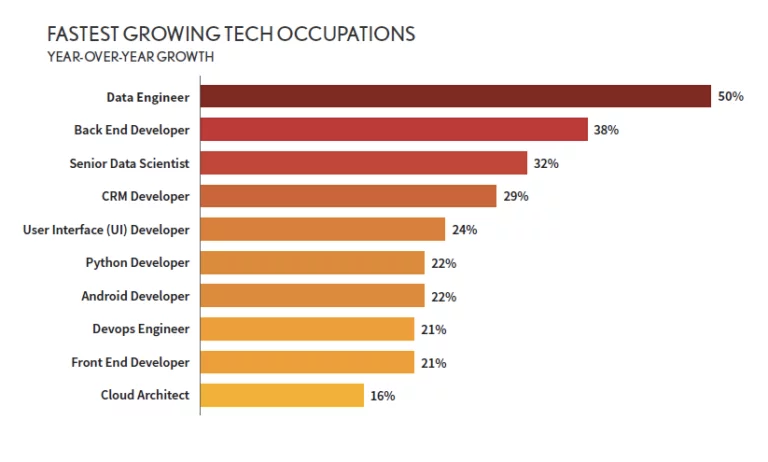The Ultimate Data Engineering Career Guide 2024
Understanding Data
Data engineering is a field that combines computer science, statistics, and data analysis to design and implement systems for managing and processing large amounts of data. Data engineers play a crucial role in the data science pipeline, as they are responsible for building and maintaining the infrastructure necessary to collect, store, clean, and transform data. They work closely with data scientists and analysts to ensure the availability and quality of data needed for decision-making and insights.

Data engineering involves the use of programming languages such as Python or SQL, database management systems, and big data processing frameworks like Hadoop or Spark. It requires a strong understanding of data structures, algorithms, and distributed systems. Data engineers also need to stay updated with emerging technologies and best practices in order to effectively manage and process the ever-increasing volume of data.
Below are several important daily statistics that are featured in the infographic:

Image source:Raconteur
It is predicted that by 2025, there will be 463 exabytes of data generated daily worldwide, which is equivalent to 212,765,957 DVDs per day.
Data Engineering Basics
Data engineering is the foundation upon which data science and analytics are built. It involves designing and implementing systems to collect, store, clean, and process large volumes of data. Data engineers use programming languages like Python or SQL and big data processing frameworks such as Hadoop or Spark to manage and manipulate data effectively. They also need to have a strong understanding of data structures, algorithms, and distributed systems. By ensuring the availability and quality of data, data engineers enable data scientists and analysts to extract valuable insights for decision-making. Attention to detail and problem-solving skills are essential in data engineering, as even small errors can have significant consequences on the analysis process.

Importance of Data Engineering in the Tech Industry
Data engineering plays a vital role in the tech industry as it enables organizations to harness the power of data for informed decision-making. With the exponential growth in data generated, data engineers are instrumental in designing and implementing robust systems to collect, store, clean, and process large volumes of data. They ensure that data is readily available, reliable, and easily accessible to data scientists and analysts. By building scalable infrastructure and optimizing data pipelines, data engineers enable efficient data processing and analysis. Their work directly impacts the accuracy and quality of insights derived from data, empowering organizations to make data-driven decisions and gain a competitive edge in the industry. Without effective data engineering, the potential of data science and analytics would remain untapped.
Why pursue a career in data engineering?
Working in this industry can be a mix of satisfaction and difficulty. You will have a crucial part to play in the success of a company by making data more accessible to those who need it for their work. Your ability to program and solve problems will be essential in developing solutions that can grow and adapt as needed.
Data engineers will continue to be sought after as long as there is a need to work with data. In 2019, Dice Insights highlighted data engineering as a highly desirable job within the technology sector, surpassing the demand for computer scientists, web designers, and database architects. Similarly, LinkedIn included data engineering on its list of growing job opportunities for 2021.
Building a Strong Foundation
Building a strong foundation is crucial for a successful career in data engineering. To excel in this field, individuals need to acquire key skills such as programming languages (such as Python, Java, or Scala), database management, data modeling, and ETL (Extract, Transform, Load) processes. They should also have a good understanding of cloud platforms like AWS or Azure and be familiar with big data technologies like Hadoop and Spark.
To gain these skills, aspiring data engineers can pursue various educational paths such as bachelor’s degrees in computer science or related fields, online courses, or specialized certifications. These educational opportunities provide the necessary knowledge and techniques to effectively design and manage data systems.
By building a strong foundation in data engineering, individuals can position themselves for success in this rapidly evolving industry.
Key Skills for Data Engineering
Data engineering requires a strong set of skills to effectively design and manage data systems. Begin your journey into a career in data science by mastering the basics of cloud computing, coding, and database design.
- Knowledge of coding languages is necessary for this position, so it is recommended to enroll in courses to improve and polish your skills. Some commonly used programming languages are SQL, NoSQL, Python, Java, R, and Scala.
- Relational and non-relational databases are commonly used solutions for storing data. It is important to understand the functionality of both types of databases.
- ETL systems involve extracting, transforming, and loading data from various sources into a central repository such as a data warehouse. Popular ETL tools for this purpose include Xplenty, Stitch, Alooma, and Talend.
- Storing data varies depending on the type, especially with large amounts of data. It’s important to understand when to utilize a data lake versus a data warehouse when designing data solutions for a company.
- Automation and scripting are essential components when dealing with large amounts of data due to the sheer volume of information that organizations can gather. It is imperative to have the ability to create scripts that can automate tasks that are repetitive.
- Although machine learning is typically the domain of data scientists, it can be advantageous to have a basic understanding of the concepts in order to effectively support and collaborate with data scientists on your team.
- Big data tools: Data engineers are not only dealing with normal data. They frequently handle large amounts of data. The tools and technologies for this task are constantly changing and differ from company to company, but some widely used ones include Hadoop, MongoDB, and Kafka.
- Cloud computing: It is important to have knowledge about cloud storage and cloud computing as more companies are transitioning from physical servers to cloud services. Beginners may want to take a course in Amazon Web Services (AWS) or Google Cloud to learn more about this technology.
- Data security is a priority for many companies, with some having specific teams dedicated to this task. However, data engineers are often responsible for ensuring that data is securely stored and managed in order to prevent any potential loss or theft.
Acquiring these key skills will lay a strong foundation for a successful career in data engineering.
Educational Paths and Certifications
To embark on a successful career in data engineering, there are various educational paths and certifications you can pursue. Many universities offer undergraduate and graduate degrees in fields like computer science, software engineering, or data science, providing a strong foundation in relevant technical skills. Additionally, there are online platforms and bootcamps that offer specialized data engineering courses and certifications. Some popular certifications include the AWS Certified Big Data – Specialty, Google Cloud Professional Data Engineer, and Microsoft Certified: Azure Data Engineer Associate. These certifications validate your expertise in working with specific cloud platforms and technologies. By obtaining these qualifications, you can enhance your credibility and demonstrate your proficiency to potential employers in the competitive data engineering field.
Gaining Practical Experience
Gaining practical experience is essential for aspiring data engineers to solidify their skills and enhance their employability. Internships and entry-level positions provide valuable opportunities to work on real-world projects, collaborate with experienced professionals, and understand the intricacies of data management and analysis. Taking on personal projects and building a portfolio showcases your abilities and creativity in handling data engineering tasks. By working on diverse projects independently, you can demonstrate your problem-solving skills, adaptability, and innovation to potential employers. Additionally, joining open-source communities or participating in hackathons can further expand your network and expose you to different data engineering challenges. These practical experiences not only enhance your technical proficiency but also demonstrate your commitment and passion for the field.
Internships and Entry-Level Positions
Internships and entry-level positions are valuable opportunities for aspiring data engineers to gain practical experience in the field. These roles provide hands-on experience working on real-world projects and allow individuals to collaborate with experienced professionals. By joining an internship or entering an entry-level position, data engineering enthusiasts can develop their skills and acquire industry-specific knowledge. These experiences also offer a chance to understand the intricacies of data management and analysis within a professional setting. Additionally, internships and entry-level positions provide the opportunity to network with industry experts and build connections that can be beneficial for future career opportunities. Taking advantage of these opportunities can significantly enhance one’s employability in the competitive job market.
Personal Projects and Portfolio Development
Personal projects and portfolio development are crucial steps in the data engineering career roadmap. By working on personal projects, aspiring data engineers can apply their skills to real-world scenarios and showcase their abilities to potential employers. Building a strong portfolio of completed projects demonstrates initiative, creativity, and problem-solving skills. These projects could include creating data pipelines, building databases, or developing data visualization tools. Moreover, having a portfolio enables data engineers to stand out in a competitive job market and provides tangible evidence of their capabilities. It is important to choose projects that align with specific interests and career goals to maximize their impact. Additionally, sharing these projects through platforms like GitHub or personal websites further enhances visibility and increases opportunities for professional growth.
Specializing in Data Engineering
Specializing in Data Engineering allows professionals to delve deeper into specific subfields and enhance their expertise in data management, infrastructure, and analytics. Data Engineering offers several areas for specialization such as data integration, ETL (Extract, Transform, Load) processes, data warehousing, big data processing, or cloud-based solutions. By specializing in a particular area of data engineering, individuals can become invaluable contributors to organizations that have specific needs or challenges. Advanced courses and specializations provide opportunities to acquire specialized knowledge and hands-on experience with the latest tools and technologies. Additionally, obtaining certifications in specific areas of data engineering can further demonstrate proficiency and open doors to more advanced career opportunities. Ultimately, specializing in data engineering allows professionals to become highly sought-after experts in their chosen field.

Data Engineering Subfields
Data Engineering offers professionals the opportunity to specialize in various subfields based on their interests and career goals. These subfields encompass specific areas of expertise within data engineering and enable individuals to develop specialized knowledge and skills. Some common subfields in data engineering include data integration, ETL (Extract, Transform, Load) processes, data warehousing, big data processing, and cloud-based solutions. By focusing on a particular subfield, data engineers can become proficient in the tools, technologies, and best practices that are specific to that area. This specialization allows them to contribute valuable insights and solutions to organizations that have specific data management needs or challenges. Gradually becoming an expert in a subfield can lead to advanced career opportunities and higher demand for their expertise.
Advanced Courses and Specializations
To further enhance their skills and expand their expertise, data engineers can pursue advanced courses and specializations in data engineering. These programs provide in-depth knowledge on specific aspects of data engineering and offer hands-on experience with advanced tools and technologies. Some popular areas of specialization include big data processing, cloud-based solutions, machine learning, and data warehousing. Advanced courses often cover topics such as distributed systems, data modeling, data visualization, and data governance. These courses can be completed online or through university programs, and many offer certifications upon completion. By completing advanced courses and specializations, data engineers can stay updated with the latest advancements in the field and differentiate themselves in the job market.
Data engineer responsibilities
Data engineers play a crucial role in managing and processing large volumes of data. Their main responsibilities revolve around designing, constructing, and maintaining data architectures and infrastructure. They are responsible for collecting, cleaning, transforming, and storing data to ensure its availability and accessibility to other stakeholders. Data engineers also collaborate with data scientists and analysts to understand their data requirements and implement solutions accordingly. They are skilled in programming languages such as Python or Java and proficient in SQL and database management systems. Additionally, data engineers are responsible for ensuring data quality, monitoring system performance, and implementing security measures to protect the integrity of the data.
How Do Data Engineers Bring Value to Organizations?
Data engineers bring immense value to organizations by enabling the efficient collection, storage, and processing of data. They play a pivotal role in developing robust data pipelines and architectures that ensure the availability and accessibility of data to various stakeholders. By optimizing data infrastructure and implementing efficient data storage solutions, such as data warehousing or cloud-based systems, they enable faster and more accurate data analyses.
Data engineers also contribute to improving the overall quality and reliability of data by implementing data validation and cleansing processes. This helps organizations make informed decisions based on trustworthy data. Additionally, they collaborate with cross-functional teams, including data scientists and analysts, to understand their specific data requirements and develop tailored solutions.
Overall, data engineers empower organizations to harness the full potential of their data for informed decision-making and business growth.
Data Engineer Career Path
Data engineers can pursue a fulfilling and progressive career path in the field of data engineering. With experience and advancing skill sets, data engineers have the opportunity to take on more challenging projects and responsibilities. They can also specialize in specific subfields of data engineering, such as big data processing, data warehousing, or cloud computing. Continuous learning and staying updated with the latest technologies are key to unlocking growth opportunities in this rapidly evolving field. Moreover, networking with professionals in the industry can help access job openings and advance their careers.
Below are a few responsibilities that you will have in your data engineering profession.
- Junior Data Engineer: A starter role that centers on acquiring fundamental skills and knowledge in the field of data engineering.
- Data Engineer: He/She is in charge of creating and managing data channels.
- Senior Data Engineer: Responsibilities include designing more intricate pipeline structures and providing guidance and support to less experienced engineers.
- Data Engineering Manager or Technical Lead: Responsible for supervising a group of data engineers and overseeing extensive projects.
- Solution Architect: Creating the overall data infrastructure and architecture for a company.
Data Engineer Salary
The salary of a data engineer can vary depending on factors such as experience, location, and company size. According to Glassdoor, the average annual salary for a data engineer in the United States is around $110,000. However, data engineers with more experience and expertise can earn salaries well into six figures. In addition to base salary, data engineers may also receive bonuses and benefits. As the demand for data engineers continues to grow, so does their earning potential. It’s important to note that salaries can differ across industries and regions. Researching industry standards and negotiating compensation packages based on skill set and qualifications can help data engineers secure a competitive salary.
Starting or junior data engineers can expect to earn between $60,000 and $100,000 annually.
A Mid-Level Data Engineer earns an annual salary ranging from $90,000 to $130,000.
Experienced Data Engineer: Earns a salary ranging from $120,000 to $180,000 annually or potentially higher.
According to Glassdoor’s November 2023 data, the typical annual base salary for data engineers in the United States is $106,153, but some may earn as high as $152,000.
Navigating the Job Market
When it comes to navigating the job market as a data engineer, there are a few key strategies that can help you land your dream job. First and foremost, it’s important to tailor your resume and cover letter to highlight your relevant skills and experiences in data engineering. Additionally, networking is crucial in this industry. Attend industry events, join online communities, and connect with professionals in the field to expand your network and learn about potential job opportunities. Utilizing online job boards and professional social media platforms can also be a valuable resource for finding open positions. Lastly, be prepared for interviews by researching the company, practicing common data engineering interview questions, and showcasing your problem-solving abilities. With these tips, you’ll be well-equipped to navigate the competitive data engineering job market and secure exciting career opportunities.
Job Search Strategies
When it comes to searching for a job as a data engineer, there are several effective strategies that can make your job search more fruitful. First and foremost, it’s crucial to customize your resume and cover letter to highlight your relevant skills and experiences in data engineering. Utilize online job boards like LinkedIn, Indeed, and Glassdoor to search for open positions. Networking is also essential in this field – attend industry events, join online communities, and connect with professionals in the data engineering field. Additionally, leverage professional social media platforms like LinkedIn to build your online presence and showcase your skills. Finally, be proactive in your job search by reaching out directly to companies you’re interested in and following up on leads. With these strategies in place, you’ll increase your chances of finding exciting career opportunities as a data engineer.
Preparing for Data Engineering Interviews
Preparing for Data Engineering Interviews can be a critical step in securing your dream job in the field. To excel in these interviews, it is essential to showcase your technical skills and demonstrate your understanding of data engineering concepts. Brush up on key topics such as database systems, data modeling, ETL processes, and cloud computing. Additionally, familiarize yourself with popular data engineering tools like Apache Spark, Hadoop, SQL, and Python. Practicing coding exercises and solving real-world data engineering problems will help you gain confidence and refine your problem-solving abilities. It’s also important to stay updated with the latest trends and advancements in the field of data engineering. By combining technical knowledge with effective communication skills and a positive attitude, you’ll be well-prepared to impress potential employers.
Advancing Your Career
After establishing a strong foundation in data engineering, the next step is advancing your career. In this dynamic field, there are various opportunities for growth and advancement. One avenue is to specialize in a specific data engineering subfield such as big data processing, streaming data, or cloud computing. By gaining expertise in these areas, you can become an invaluable asset to organizations looking to harness the power of data. Additionally, pursuing advanced courses and specializations can deepen your knowledge and enhance your skillset. Continuous learning and networking are also crucial for career advancement. Participating in industry events, joining professional organizations, and building relationships with other data professionals can open doors to new opportunities and collaborations. With dedication and ongoing commitment to self-improvement, you can climb the ladder of success in your data engineering career.
Career Growth Opportunities in Data Engineering
In the field of data engineering, there are numerous career growth opportunities available. As organizations continue to rely on data for strategic decision-making, the demand for skilled data engineers is on the rise. Data engineers can advance their careers by specializing in specific subfields such as big data processing, streaming data, or cloud computing. By developing expertise in these areas, they can become valuable assets to companies looking to harness the power of data. Additionally, pursuing advanced courses and specializations can deepen their knowledge and enhance their skill set. Continuous learning and networking are also crucial for career advancement. Participating in industry events, joining professional organizations, and building relationships with other data professionals can open doors to new opportunities and collaborations. With dedication and ongoing commitment to self-improvement, data engineers can climb the ladder of success in their career.
Networking and Continuous Learning
Networking and continuous learning are crucial for advancing a career in data engineering. Building a strong professional network allows data engineers to connect with peers, mentors, and industry experts, opening doors to new opportunities and collaborations. Joining professional organizations and participating in industry events can provide valuable networking opportunities. Continuous learning is essential in the rapidly evolving field of data engineering. Staying up-to-date with the latest technologies, tools, and best practices ensures that data engineers remain competitive in the job market. By attending workshops, webinars, and pursuing additional certifications or advanced courses, data engineers can deepen their knowledge and enhance their skill set. Engaging in networking and continuous learning can unlock new career growth opportunities and help data engineers stay at the forefront of their field.

In summary, data engineering stands out as one of the most sought-after roles in the field of data science, making it an excellent career path for those aspiring to become data professionals.
If you aspire to become a data engineer but are unsure about where to begin, we strongly advise you to consult our career guide. This resource will provide you with the essential knowledge required to excel in the field of data engineering.
